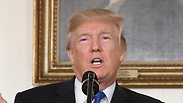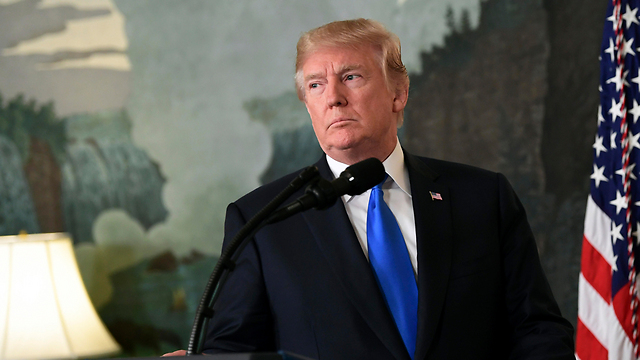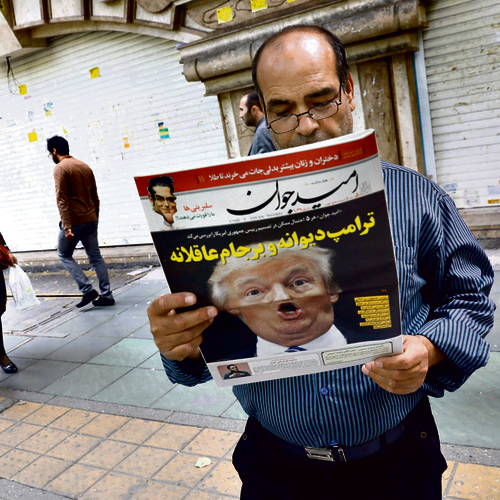

Trump’s Iran strategy presents new kind of challenge for Israel
Analysis: Israeli defense officials believe nuclear agreement shouldn’t be nixed and American pressure should be used to curb missile threat and moderate Iran’s regional expansion. This allegedly contradicts government’s policy, but even Netanyahu realizes it’s impossible to cancel an international agreement without real cause and without other parties’ consent.
What would Israel like the outcome of the speech to be? What is Israel’s interest? According to Israel's security echelon, the nuclear agreement with Iran is bad for Israel. But as long as Iran upholds it—the threats are not imminent. The agreement gives the West time, 13 years from now, to curb the nuclear project.
At the moment, the Iranian threat to Israel focuses on two issues that are not covered by the nuclear agreement—Iran's progress in the development of precision-guided surface-to-surface missiles, and the growing Iranian influence in Syria, Iraq and Yemen.

Israel is not the only country concerned by these two developments. The region’s Sunni states—Saudi Arabia, Egypt, the United Arab Emirates, and Turkey under certain conditions—are even more concerned. The European Union countries are afraid the development of accurate Iranian missiles would pose a direct threat to Europe, while an Iranian takeover of Syria could hit Europe with a renewed wave of Sunni refugees from Syria.
This concern is shared by the American defense establishment. It’s no coincidence Trump mentioned Iran and North Korea in the same breath.
There is an almost global consensus on these two issues—the missiles and the expansion. Even Vladimir Putin’s Russia, which is currently cooperating with Iran in Syria, isn’t eager to see an Iranian hegemony in the region.
Moreover, the Israeli defense establishment doesn’t see Iran as a monolithic country. The Revolutionary Guards have one agenda. The commander of the Iranian forces in Syria, Qasem Soleimani, strongly represents that agenda. He aspires to create an Iranian land corridor from Tehran to the Mediterranean Sea.
Iranian President Hassan Rouhani has different aspirations: His goal is to improve the economic situation. Iran has invested more than $1 billion a year in Syria, in addition to $800 million in Hezbollah every year. Hundreds of Iranian officers and soldiers have been killed in the civil war.
Israeli defense officials are convinced the last Islamic State cells in Syria will be eliminated within two or three months. According to Israeli assessments, the damages of the war have reached $280 billion. President Rouhani is demanding a large chunk of the funds that will be infused for the country’s reconstruction. He is also interested in Iranian involvement in Syria's oil fields. Russia is expecting to receive a chunk of the Syrian economy as well.
Syrian President Assad, meanwhile, is maneuvering between his two patrons with a considerable amount of talent. The Israelis, who disregarded him at the beginning of the civil war, have learned to take him seriously again.

Rouhani’s main interest is expanding Iran’s economic ties with the world, which is why he hasn’t deviated from a single clause in the nuclear agreement. Trump admitted it in his speech. He is accusing Iran of violating the “spirit” of the agreement, not the agreement itself.
The conclusion reached by Israeli defense officials is clear: There is no room for nixing the agreement at the moment; the American pressure should be used to push the missile threat away and moderate the Iranian expansion in the region. This pressure will match the interests of Rouhani and his supporters, as well as the interests of all world powers, including Russia. Israel can contribute its share. In fact it is already doing its part: Both in dozens of strikes in the past year—according to foreign sources—on Iranian targets in Syria, and perhaps mainly through its influence in Washington.
Everything I have said here allegedly contradicts the Israeli government’s policy. In his speeches, Prime Minister Netanyahu is calling for a one-sided cancellation of the nuclear agreement. It’s only an alleged contradiction, however. We shouldn’t rule out the possibility that Netanyahu is presenting the maximum demand in a bid to improve the minimum result. He too realizes it’s impossible to cancel an international agreement without real cause and without the consent of the other countries that signed the agreement.
The question is where is Trump leading us to—assuming he actually knows where he’s leading to. Like in the crisis with North Korea, Trump is creating an ultimatum with his rhetoric. The ultimatum is directed at the two rebellious countries, but also at his allies in NATO, his party’s representatives in Congress and the entire Congress. It’s a gamble that could end in a disaster—either war or the United States losing its credibility.
Trump’s critics in Washington, including senior members of the Republican Party, have called him “a dangerous man.” The fear Trump would make an unwise decision is so big, that Congress is being pressed to enact a law to limit the president's use of nuclear weapons. His rivals in Congress are trying to take the red button away from him.
On the other hand, Trump’s attempt to rectify historic mistakes made both vis-à-vis the regime in Pyongyang and vis-à-vis the regime is Tehran is commendable. The gun has been placed on the table. No one knows how it will be used—not even Donald Trump.
















